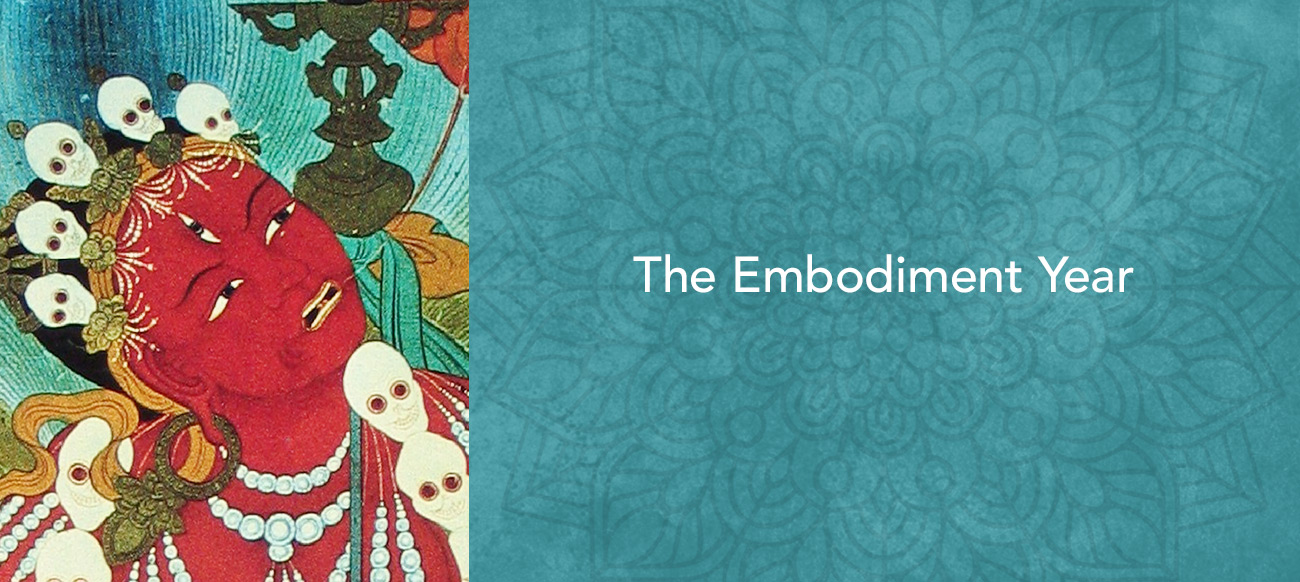by Joe Loizzo, MD, PhD

Today’s confluence of breakthrough neuropsychological research and diverse methods of mind/body health and well-being has coalesced in a new multi-disciplinary consensus and a historic confluence of distinct therapeutic approaches. Centered around a positive new science of human nature and a radically optimistic framework of plasticity, learning and change, this watershed has prompted a dialogue about mental health and well-being that not only crosses the lines between distinct schools of psychotherapy, but also the lines between Eastern and Western, ancient and modern, scientific and spiritual approaches to mind/body healing. Nowhere is the promise of this watershed more apparent than in the surprising convergence of the latest neuropsychology and embodied approaches to trauma with the timeless embodied contemplative psychology and transformational arts of the Tibetan Buddhist Tantras.
The Promise of Tantra
What is Tantra? Tantra is an evolutionary depth-psychology and embodied transformational practice based on the premise that all humans, given the right maps and tools, and enough time, support and skilled mentoring, can gradually fully transform not just their historic trauma, but also the unconscious self-protective perception, affect, reactivity and neurogenomic processing that drive our default traumatic mode of being and living.
The exceptional promise and effectiveness of Tantra stems from the fact that its model and methods approach embodiment in a fundamentally different way than contemporary embodied approaches to healing. Instead of seeing and treating embodiment as most contemporary approaches do—at the level of gross anatomy and physiology, often observed and engaged externally—it sees and treats it at the level of subtle and extremely subtle anatomy and physiology, observed and engaged both internally and externally through coordinated, trained interoception and self-regulation.
The Embodiment Year
At Nalanda Institute, we are dedicated to helping people from all backgrounds integrate contemplative science, practice and ethics into contemporary psychotherapy and other caregiving arts. This has been the mission of our Contemplative Psychotherapy Program, which so far has spanned two years, one exploring Mindfulness-Based Psychotherapy and another exploring Compassion-Based approaches.
This Fall, we are excited to be launching the culmination of our contemplative psychotherapy journey—a “third year” program with two specialized tracks focused on Embodied Contemplative Psychotherapy and Embodied Psychosocial Change. This unprecedented program will weave together the timeless embodied transformational psychology of the Tibetan Tantras with the timely turn towards embodied approaches to healing individual and collective trauma and fostering personal and communal well-being.
The Contemplative Psychotherapy track of this program is devoted to fostering the first rigorous, ongoing dialogue between the Anuttara-Yoga Tantra’s multi-dimensional approach to trauma through embodied mentoring, restructuring perception and transforming the subtle body, and contemporary embodied therapeutic approaches including Jungian, Kohutian and Intersubjective analysis, EMDR, Gestalt Therapy, Radical Healing of Racial Trauma, Somatic Experiencing, Sensorimotor Therapy, Polyvagal Therapy and Psychedelic-Assisted Therapy.
The year will begin with a traditional initiation by Dr. Nida Chenagstang into the Unexcelled Yoga Tantra practice of the Medicine Buddha, will be facilitated by core faculty Joe Loizzo, Pilar Jennings and program director Fiona Brandon, and will feature a distinguished visiting faculty including Mar Aige, Chantelle Brown, James Bae, Sieso Paul Cooper, Bruce Ecker, Janina Fisher, Jerry Lamagna, Phillip Lister, Zachary Model, Jasmine Syedullah, Jessie Westfall, Jan Willis and others.
This program will support participants in developing their own Highest Yoga Tantra practice to deepen their embodiment of lucid intuition and blissful compassion, and offer step by step guidance in how to apply Tantric methods of mentoring, visioning and embodiment to enrich their practice of psychotherapy, integrative healthcare, yoga therapy, art therapy, coaching and/or mentoring.
If you happen to be a graduate of our CPP program, or have a similarly rigorous grounding in the personal and professional practice of mindfulness and compassion, please consider joining CPP graduates James Bae, Chantelle Brown, Zachary Model, Kristen Rae Stevens, facilitators Pilar Jennings, Fiona Brandon, Rahshaana Green, Geri Loizzo and me, along with our inspiring guest lecturers on this journey towards deepening practice, expanding and refining skills, and embodying your transformative vision and realization!
A Sample of What’s in Store
If you’d like a taste of what this third year will be, we offer this video of visiting faculty Janina Fisher exploring the nuances of an embodied contemplative approach to trauma called Sensorimotor Psychotherapy.
Joe Loizzo, MD, PhD is Nalanda Institute’s Founder and Academic Director.
Janina Fisher, PhD was a guest lecturer in the Contemplative Psychotherapy Program.
Editor’s note: Find out more about our Fall CPP offerings including the Embodiment Year.
